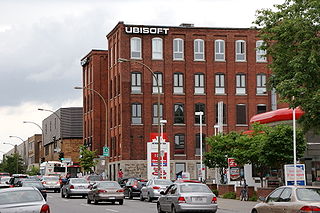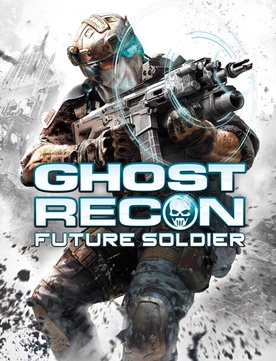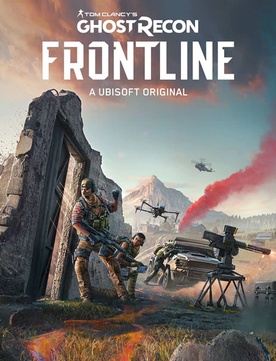
Ubisoft Entertainment SA is a French video game publisher headquartered in Saint-Mandé with development studios across the world. Its video game franchises include Assassin's Creed, Far Cry, For Honor, Just Dance, Prince of Persia, Rabbids, Rayman, Tom Clancy's, and Watch Dogs.
Tom Clancy's Ghost Recon is a series of military tactical shooter video games published by Ubisoft. In the series, the player is in charge of a fictional, newly conceived squad of U.S. Army Special Forces soldiers from Delta Company, 1st Battalion, 5th Special Forces Group stationed at Fort Bragg. Except for the "1st Battalion, 5th SFG" designation, this reconnaissance unit is entirely fictional, as Special Forces Battalions currently only support three Companies. They are often referred to as "the Ghosts". Their role is like other real world special operations forces, in that their operations are kept highly classified. In Tom Clancy's Ghost Recon: Future Soldier, it is shown that the Ghost's unit has multiple designations and is part of JSOC; they are also known as the Group for Specialized Tactics, much like real JSOC units such as Delta Force and SEAL Team Six. Tom Clancy's Ghost Recon has also been novelized by Grant Blackwood under the pseudonym David Michaels.

Tom Clancy's Ghost Recon 2 is a tactical shooter video game developed by Red Storm Entertainment and published by Ubisoft for Xbox, PlayStation 2 and GameCube. A Microsoft Windows version was planned but cancelled in April 2005 in favor of Tom Clancy's Ghost Recon Advanced Warfighter. It is a direct sequel to the 2001 video game Tom Clancy's Ghost Recon.
Platinum Hits is a term used to refer to a line of select Xbox games that were considered by Microsoft to have sold considerable units on the platform in the nine months after release, and have dropped in price from their original MSRP to a newer, lower price, generally that of $19.99, although multi-game packs may sell for more. A similar budget range in PAL markets is known as Xbox Classics for £19.99 and Best of Classics for £9.99. In Japan, they are known as Platinum Collection games and generally cost ¥2,800, with a number of games such as Grand Theft Auto IV and Dynasty Warriors 6 at a higher price point of ¥3,800. Sales requirements may vary by region.

Assassin's Creed is an action-adventure game developed by Ubisoft Montreal and published by Ubisoft. It is the first installment in the Assassin's Creed series. The video game was released for PlayStation 3 and Xbox 360 in November 2007. A Microsoft Windows version titled Assassin's Creed: Director's Cut Edition containing additional content was released in April 2008.

Ubisoft Divertissements Inc., doing business as Ubisoft Montreal, is a Canadian video game developer and a studio of Ubisoft based in Montreal.

Tom Clancy's Ghost Recon: Future Soldier is a third-person tactical shooter video game developed and published by Ubisoft for the PlayStation 3, Xbox 360 and Microsoft Windows. It was released in May and June 2012. Tom Clancy's Ghost Recon: Future Soldier was announced to be in development by Ubisoft on January 22, 2009. The game has a futuristic take on the Ghost Recon series. The campaign has settings such as Bolivia, Zambia, Nigeria, Pakistan, Russia, and Norway.

Assassin's Creed is an open-world, action-adventure, and stealth game franchise published by Ubisoft and developed mainly by its studio Ubisoft Montreal using the game engine Anvil and its more advanced derivatives. Created by Patrice Désilets, Jade Raymond, and Corey May, the Assassin's Creed video game series depicts a fictional millennia-old struggle between the Order of Assassins, who fight for peace and free will, and the Knights Templar, who desire peace through order and control. The series features historical fiction, science fiction, and fictional characters intertwined with real-world historical events and historical figures. In most games, players control a historical Assassin while also playing as an Assassin Initiate or someone caught in the Assassin–Templar conflict in the present-day framing story. Considered a spiritual successor to the Prince of Persia series, Assassin's Creed took inspiration from the novel Alamut by the Slovenian writer Vladimir Bartol, based on the historical Hashashin sect of the medieval Middle East.

Tom Clancy's is a branding used by video game company Ubisoft for several video games, some of which feature the works of American author Tom Clancy, while others do not. Various sub-series are often unrelated to each other with a few exceptions, although most are shooters set in modern or near-future military settings.

Tom Clancy's Ghost Recon Wildlands is a third-person tactical shooter video game developed by Ubisoft Paris and Ubisoft Milan, and published by Ubisoft. It was released worldwide on March 7, 2017, for PlayStation 4, Windows, and Xbox One as the tenth installment in the Tom Clancy's Ghost Recon franchise and is the first game in the Ghost Recon series to feature an open world environment.

Snowdrop is a proprietary game engine created by Massive Entertainment and Ubisoft for use on Microsoft Windows, PlayStation 4, PlayStation 5, Xbox One, Xbox Series X/S, Nintendo Switch, Stadia, and Luna. It was revealed at E3 2013 with Tom Clancy's The Division, the first game using the engine. Snowdrop is one of the primary game engines used by Ubisoft along with Disrupt, Dunia, and Ubisoft Anvil.

Tom Clancy's Ghost Recon Breakpoint is a tactical shooter video game developed by Ubisoft Paris and published by Ubisoft. The game was released worldwide on 4 October 2019 for PlayStation 4, Windows, and Xbox One, and on 18 December 2019 for Stadia. The game is the eleventh installment in the Tom Clancy's Ghost Recon franchise and is a narrative sequel to the 2017 video game Tom Clancy's Ghost Recon Wildlands.

Assassin's Creed Valhalla is a 2020 action role-playing video game developed by Ubisoft Montreal and published by Ubisoft. It is the twelfth major installment in the Assassin's Creed series, and the successor to 2018's Assassin's Creed Odyssey. Principally set in the years 872–878 AD, the game recounts a fictional story during the Viking expansions into the British Isles. Players control Eivor Varinsdottir, a Viking raider who, while attempting to establish a new Viking clan in England, becomes embroiled in the centuries-old conflict between the Assassin Brotherhood, who fight for peace and liberty, and the Templar Order, who desire peace through control. The game also includes a framing story, set in the 21st century, which follows Layla Hassan, an Assassin who relives Eivor's memories so as to find a way to save the Earth from destruction.

Tom Clancy's Ghost Recon Frontline is a cancelled live-service first-person massively multiplayer online PvP class-based tactical shooter battle royale game by Ubisoft announced on October 6, 2021. It was under development for Microsoft Windows, PlayStation 4, PlayStation 5, Xbox One and Xbox Series X/S, plus Amazon Luna and Google Stadia. On July 21, 2022, Ubisoft announced that it had cancelled development of the game.

Assassin's Creed Mirage is a 2023 action-adventure game developed by Ubisoft Bordeaux and published by Ubisoft. The game is the thirteenth major installment in the Assassin's Creed series and the successor to 2020's Assassin's Creed Valhalla. While its historical timeframe precedes that of Valhalla, its modern-day framing story succeeds Valhalla's own. Set in 9th-century Baghdad during the Islamic Golden Age—in particular during the Anarchy at Samarra—the story follows Basim Ibn Ishaq, a street thief who joins the Hidden Ones to fight for peace and liberty, against the Order of the Ancients, who desire peace through control. The main narrative focuses on Basim's internal struggle between his duties as a Hidden One and his desire to uncover his mysterious past.













